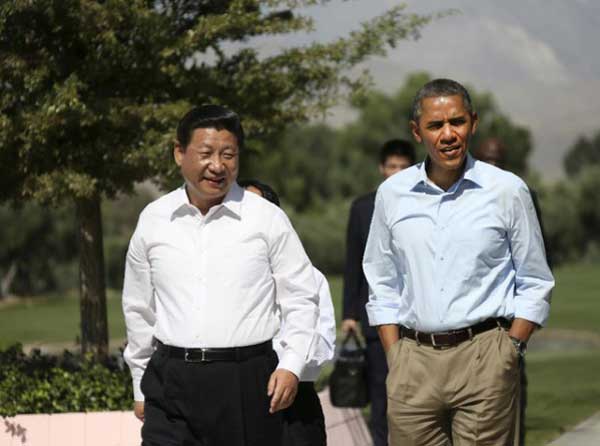Avoiding usual traps and building China-US trust
Updated: 2015-09-22 07:42
(China Daily)
|
|||||||||||
 |
|
In 2013, Xi had a meeting with US president Barack Obama in Annenberg Estate, California. [Photo/Agencies] |
Symbolism matters in state visits, especially as President Xi Jinping embarks on his first state visit to the United States.
To many observers, how the Chinese leader is treated, what he gives and receives on this meticulously planned trip announced seven months ago will be highly symbolic. That would not only be an official indicator of the actual state of Sino-US ties today, but also provide clues to the prospect of the Beijing-proposed "new type of major-country relationship".
A carefully choreographed rapport is essential for Xi's visit, because Sino-US ties are at a tricky crossroad. They can either succumb to the foreordination of the "Thucydides trap", or blaze a new trail and prove that a rising power and an existing one don't necessarily have to enter a confrontation.
The current state of Sino-US relationship is not ideal. Otherwise there would not have been the rhetoric about a "new Cold War", even the possibility of a hot one. But the talk of "frenemy" itself reflects the significant constructive potential of bilateral ties.
It is natural for Beijing and Washington to have different priorities and expectations regarding the visit. Divergent as they are, their lists of concerns do overlap on such matters as climate change and global economic recovery. A state visit like this should be more about two leaders removing stumbling blocks and less about re-endorsing consensus.
The two sides may not agree on everything. Disagreements are unavoidable on issues such as human rights. But so long as both sides agree to disagree, bilateral relations won't worsen.
Xi and US President Barack Obama, however, can do more than that. They should take advantage of the closeness created at their past two informal meetings at Sunnylands in California and Zhongnanhai in Beijing, and discuss in detail matters of concern.
Since most problems troubling Sino-US ties have their roots in a perception gap, Xi and Obama should use the visit to assure each other of their intentions. Substantial business deals will bind the two economies more tightly together. But it will make everything easier if Beijing and Washington work together to reduce mutual distrust.
The visit will be a tremendous success if Xi and Obama leave their meetings more sympathetic to each other's concerns.
Related Stories
Xi's US visit to enhance mutual trust: experts 2015-09-21 15:45
Xi's 2012 US tour as Chinese vice-president 2015-09-21 15:52
Top 15 Chinese CEOs to attend US roundtable during Xi's visit 2015-09-21 11:19
Xi visits US, attends UN summits 2015-09-21 09:16
Today's Top News
UK's guarantee seen boosting China nuclear energy role
UK nuclear industry has high hopes on Chinese investment
Greek leftist Tsipras returns in unexpectedly decisive vote win
Young people from US look forward to Xi's state visit: Survey
Thirteen migrants killed as boat is wrecked off Turkish coast
Sino-French fund to invest in markets worldwide
For marathon runners, it's time to shine
Refugee crisis to test EU at summit of divided leaders
Hot Topics
Lunar probe , China growth forecasts, Emission rules get tougher, China seen through 'colored lens', International board,
Editor's Picks

|

|

|

|

|

|






